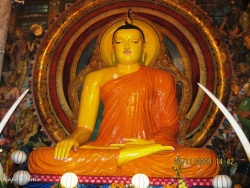Chandrakirti (Skt)
Chandrakirti (Skt)
月称 (c. 600–650) ( Jpn Gessho)
(1) A scholar of the Madhyamika school in India. In the early sixth century, Buddhapalita and Bhavaviveka wrote commentaries on Nagarjuna's Verses on the Middle Way (Skt Madhyamaka-karika ). The differences in their approach and explanation of the truth of nonsubstantiality resulted in the division of the Madhyamika school into the Prasangika school led by Buddhapalita and the Svatantrika school led by Bhavaviveka. Chandrakirti inherited the doctrine of Buddhapalita and criticized the doctrine of Bhavaviveka, thus completing the doctrine of the Prasangika school. For this reason, he is regarded as the effective founder of the Prasangika school. He asserted that the truth of nonsubstantiality is beyond the reach of logical demonstration and is attainable only by practice. The most important of his works is the Prasannapada (The Clear Worded), which is the only extant Sanskrit commentary on Verses on the Middle Way. Knowledge of the original Sanskrit text of Madhyamaka-karika is available only through the Prasannapada, the translation and study of which have therefore been carried out with great care and interest. Chandrakirti also wrote commentaries on Nagarjuna's other works and on Aryadeva's Four-Hundred-Verse Treatise. His original work is Entering the Middle Way (Madhyamakavatara). These works are extant in their Tibetan translations.
(2)[[[[月称大臣]]]]( Jpn Gassho-daijin): Also known as Chandrayashas. A minister who served Ajatashatru, the king of Magadha in India. He is mentioned in theNirvana Sutra. The king was suffering from virulent sores all over his body because of his offense of killing his father, Bimbisara, a patron of Shakyamuni Buddha. His six ministers appeared in succession before him, each exhorting him to consult a different one of the six non-Buddhist teachers for a remedy. Chandrakirti was the first of these ministers to address the king. He urged Ajatashatru to see Purana, the non-Buddhist teacher known for his denial that there is a causal relationship between one's deeds and what one experiences as a result.
See also; six minister.
